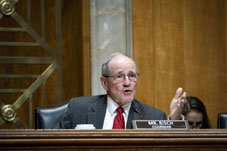
Issue of political prisoners - part of the agreement?
By Natalia Kochiashvili
Wednesday, May 13
The Georgian opposition claims that the issue of releasing political prisoners had been one of the preconditions for the agreement on the electoral system reform, which was signed on 8th of March between the ruling party and united opposition after a long process of negotiations by mediation of diplomats. In a joint statement opposition called on the Georgian President and all state institutions to help resolve the dispute promptly ‘by using [all] legitimate tools at their disposal.’
Archil Talakvadze, the speaker of the parliament of Georgia, has repudiated allegations over the ruling party’s non-compliance with the agreement on electoral reform, asserting that contrary to opposition politicians’ speculations, Georgian Dream had not committed itself to releasing ‘political prisoners.’
On 11th of May, he said in a news briefing that “the radical opposition’ is taking advantage of the fact that the negotiations on the agreement were not public and that ‘diplomatic protocol obliges ambassadors to exercise utmost restraint with regard to disclosing the content of closed-door meetings.” Talakvadze appealed to the ambassadors, who facilitated the talks, to shed light on the content of the agreement in order ‘to bring all speculations to a halt.’
Talakvadze called on the diplomatic corps to advertise the content of the closed meeting and confirm its own truth:
“Specifically, we ask them to affirm that we have not assumed the obligation to give illegal instructions to the President, the court, and the Prosecutor’s Office – in order to secure release of Gigi Ugulava, Irakli Okruashvili, and Giorgi Rurua under the agreement. We also appeal to them to provide an objective assessment of the role of each signatory in putting into practice the agreement,” the Parliament Speaker stated.
Talakvadze emphasised that for the first time, it will be possible to conduct elections in Georgia in accordance with a system based on a complete consensus of political parties and expressed his concerns that this aftermath may be put at risk by radical opposition’s irresponsible behavior.
He explained oppositions concerns as fear of elections, given ‘rock-bottom level of public support,’ seeking radical scenarios and foreign support, that are doomed to fail again. “This is evidenced by the appropriate response of the Georgian public to the letter by MEP Andrius Kubilius who, without any hesitation, demanded that the ruling party meddle in the affairs of the court,” Talakvadze said.
The Parliament Speaker noted that although the ruling party was ‘thoroughly’ fulfilling all obligations envisaged by the March 8 agreement, the opposition had doubled down on ‘improper’ politicisation of justice since the day the agreement was signed, such as demand to release Gigi Ugulava, Irakli Okruashvili and Giorgi Rurua, stressing that the ruling party made it clear that their release could in no way become a topic of political horse trading.
Talakvadze said that the opposition is threatening the public with the scuttling adoption of the constitutional amendment and such responsibility will lie solely with the radical opposition.
The opposition parties claim that the issue of releasing political prisoners had been one of the preconditions for the March 8th Agreement.
The position of the US Embassy and other facilitators is clear - the 2 parts of the March 8th agreement must be fulfilled, including a joint statement on the politicization of justice. A joint statement issued by the government and the opposition on March 8th said, “It is necessary to respond to actions that may be perceived as improper politicization of the judiciary and the electoral process, and that such actions should be avoided in the future.”
Facilitators released a joint statement responding to raised discussions. They called upon all sides to uphold the letter and spirit of both parts of the agreement with a view to its successful implementation.
The facilitators stated that the March 8th agreement was “a historic achievement by the political forces of Georgia, intended to depolarise Georgia’s political system and create a better environment for the October parliamentary elections,” following the failure of promised constitutional amendments to move to fully proportional parliamentary elections in 2020.
Joint statement underlined that as facilitators to the dialogue, ambassadors assisted in creating a forum to build trust and allow for participants to make difficult compromises. “It is not our role to make the content of those discussions public or to interpret the agreement,” statement reads,
Ambassadors noted that the resulting agreement is well-known to the public and was welcomed by Georgians and the international community, and stressed: “We note that this agreement is composed of 2 parts — one focused on the election system and the other on addressing the appearance of political interference in the judicial system.”
The US Senate Foreign Relations Committee Chairman Jim Risch has posted on his Twitter account that he expects political parties in Georgia to ‘fully implement the March agreement, including the release of political prisoners and progress towards a new electoral system.’
The US Congressman Adam Kinzinger welcomed a statement from facilitators of ongoing talks between the opposition and the government on twitter,
“It simply came to our notice then. It is important that the agreement is implemented and that the process continues,” Kingzinger wrote.
On March 8th, the ruling GD and the united opposition reached an agreement to hold the upcoming parliamentary elections this October with 120 seats in the legislative body to be distributed via a proportional vote and the remaining 30 via the majoritarian system. The agreement also foresees a fair composition of election districts, a 1% entry threshold, and a cap recognising that no single party that wins less than 40% of the votes should be able to form a majority in the next parliament.


